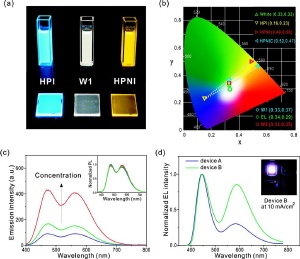Jun 10 2009
Researchers are reporting the first use of a fundamentally new approach in the quest to snare the Holy Grail of the lighting industry: An LED (light-emitting diode) - those ultra-efficient, long-lived light sources - that emits pure white light. The new approach yielded what the scientists describe as the most efficient and stable source of pure white light ever achieved. The advance could speed the development of this next-generation technology for improved lighting of homes, offices, displays, and other applications, they say. Their study appears in the May 29 online issue of the Journal of the American Chemical Society, a weekly publication.

Soo Young Park and colleagues note that white LEDs show promise as a brighter, longer-lasting and more energy-efficient light source than conventional lighting, such as incandescent and fluorescent lights, which they may replace in the future. But scientists have had difficulty producing white LEDs that are suitable for practical use. Existing technologies produce tinted shades of white light, require complex components, and become unstable over time.
The researchers describe development of a new, simpler white LED that is the first to achieve stable white light emissions using a single molecule. Their specially engineered molecule combines two light-emitting materials, one orange and one blue, which together produce white light over the entire visible range. In laboratory studies, the scientists showed that light production from an LED using the new molecule was highly efficient and had excellent color stability and reproducibility, features that make it a practical white light source.